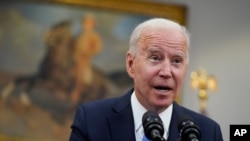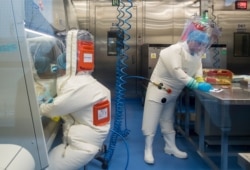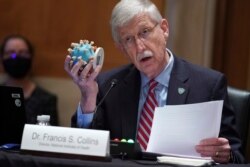Amid growing speculation that COVID-19 might have leaked from a Chinese laboratory, U.S. President Joe Biden on Wednesday instructed federal agencies "to redouble their efforts to collect and analyze information that could bring us closer to a definitive conclusion."
Biden, in a statement, told the U.S. intelligence community "to report back to me in 90 days" after he had received a report this month that had no definitive conclusion.
"It will be another whole of government of effort … by our national labs and other agencies," White House deputy press secretary Karine Jean-Pierre told reporters shortly after the president's statement was released.
U.S. officials have stressed for months that a lack of cooperation from the government in Beijing hinders outside efforts to learn more about the origins of the coronavirus that has killed at least 3.4 million people worldwide, including nearly 600,000 in the United States.
The Wall Street Journal on Monday cited a U.S. intelligence report that researchers at a Wuhan, China, lab fell ill in November 2019, a month before the Chinese government reported to the World Health Organization the first cases of the illness that would be designated as COVID-19.
"The failure to get our inspectors on the ground in those early months will always hamper any investigation into the origin of COVID-19," Biden said in his statement.
"It is most likely that this is a virus that arose naturally, but we cannot exclude the possibility of some kind of a lab accident," Dr. Francis Collins, the National Institutes of Health director, told Senate lawmakers at a hearing on Wednesday.
The WHO, which is to conduct the second phase of an inquiry into the virus's origins, has faced mounting criticism for dismissing the possibility that the new coronavirus escaped from the Chinese scientific facility, an assumption that officials in Beijing have repeatedly rejected as untrue.
Two months ago, the organization concluded in a report that it was "extremely unlikely" that COVID-19 had escaped from the Wuhan lab.
Collins told senators that the report "satisfied nobody" and "this time we need a really expert-driven, no-holds-barred collection of information, which is how we're mostly really going to find out what happened."
Some Republican lawmakers in Washington contend the WHO is not up to the task of determining the origin of the virus, in part because China has undue influence over the organization.
"Can we agree that if you took [Chinese] President Xi Jinping and turned him upside and shook him, the World Health Organization would fall out of his pocket?" Senator John Kennedy, a Louisiana Republican, asked Dr. Anthony Fauci, director of the National Institute of Allergy and Infectious Diseases, during Wednesday's hearing.
"I don't think I can answer that, sir," Fauci replied.
"Phase two of the COVID origins study must be launched with terms of reference that are transparent, science-based and give international experts the independence to fully assess the source of the virus and the early days of the outbreak," U.S. Health and Human Services Secretary Xavier Becerra told the annual meeting of the WHO on Tuesday.
Australia, Germany and Japan are among the other countries that have also this week called for the WHO to conduct a more comprehensive investigation.
One reason the United States rejoined the WHO was to hold it accountable, said Jean-Pierre, the deputy press secretary, during Wednesday's White House briefing.
"We've been very clear with the WHO to get to the bottom of this," she told reporters.
During his administration, then-President Donald Trump withdrew the United States from the WHO over its handling of the coronavirus pandemic.
In a statement on Tuesday amid growing suspicion that the virus may have escaped a Chinese laboratory, Trump said: "Now everybody is agreeing that I was right when I very early on called Wuhan as the source of COVID-19, sometimes referred to as the China Virus. To me, it was obvious from the beginning, but I was badly criticized, as usual."







